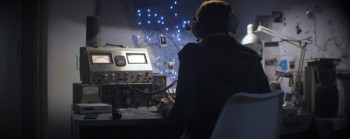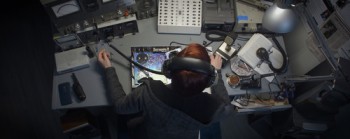Wordsmiths: Talking Horror and White Noise with Geoff Gander and Tito Ferradans
There’s been something about this past year – tons of creators I know are doing awesome things, particularly in my Ottawa backyard, nearby in Toronto and elsewhere across Canada. It sounds cliché, but watching these projects come to fruition is one of the highlights of being a creator myself, and I’ve been lucky to chat with a few people and put together interviews to share with all of you – starting today!
Recently I had the pleasure of chatting with Ottawa horror author and games writer Geoff Gander about some exciting news: the purchase of film rights to his 2014 short story “White Noise” (published in AE Sci Fi). The short film of the same name is being written and co-directed by Vancouver-based screenwriter Tito Ferradans, who joined us to discuss the process of converting from short story to film, and the horror genre in general. He also shared some screenshots from the film to give you a glimpse of what “White Noise” will look like.
Hope you all enjoy! And make sure to check out links to the White Noise Indigegogo campaign below!
Geoff, I want to start with you: this sort of deal is a rare thing for writers unless you’re a NYT bestseller. Had you imagined doing something more with “White Noise” — not just seeing it in other mediums, but seeing it expanded or given new life in any way?
Geoff Gander [GG]: I’m still pinching myself a bit about this very happy development…
When I first wrote “White Noise” I felt that it was a complete piece in and of itself — a glimpse of how an unexplained catastrophe affects communication and the linkages between us, but also illustrating how tenuous the security we derive from those linkages can be. I was also just starting out in my writing career — this was my second professional sale — so I was eager (and encouraged by my writing circle) to establish myself by sending out a steady stream of work to a variety of markets. I think I’ve become a bit more seasoned since then (though I would hesitate to say “mature”.) I have been giving “White Noise” more thought because the undefined menace behind that story could definitely be an interesting seed for something else. When I wear my game-writer hat, for example, I can see the beginnings of an adventure scenario for a post-apocalyptic setting, but that would have little to do with the story and dwell on the menace and how it affects the world. I could also see myself writing another story set in that world if I came up with a good premise, too.
I’m guessing you’re a fan of the “undefined menace” as a source of tension in fiction? Where do you think that line is between telling the readers just enough about the greater threat in a story, and providing too little information?
GG: A challenge for horror writers is that fear is very intimate and personal. I think a fairly reliable way to frighten or unsettle a reader, is to provide them with just enough information about the scenario or the adversary (whatever it might be) and let them fill in the blanks, using the emotional cues of the characters and accepted themes and tropes where appropriate. It’s a balancing act, though, as per the second part of your question. Although I enjoy Lovecraft and his contemporaries, not all of their work aged well and to describe a cosmic horror as indescribable just doesn’t wash anymore — we’ve been raised on movies dripping with CGI special effects and expect more than that in our fiction.
So where would I draw the line? If we’re talking about a creature, visual cues about size, color, texture and gait, coupled with smell and sound — plus the reactions or impressions of the POV character(s) as though I were that person: If I walked into a room and saw this thing, what would my senses register in the first 2-3 seconds, because realistically that’s about all the time I would have to process what I have seen and react? What would be the first thing I would notice? How would I feel about it? This makes it more visceral, and draws the reader down to that level. Sometimes, however, it is necessary to dwell on the details, like the aftermath of a monster’s rampage in a lab, but I think the pacing of the story and the plot would dictate that.
That makes sense; I’m thinking of a few works that focus on reaction and specific visual details.
Let’s bring Tito into this: was the undefined menace in “White Noise” one of the things that first interested you about the story? Or was it something else?
Tito Ferradans [TF]: The undefined menace wasn’t in truth what drew me in; it was how quickly and effectively Geoff built White Noise’s universe. The pictures just unfolded in my head as I went through Amanda’s monologue. And that ending…
It was only when translating the story into a screenplay that I realized the vague aspects of the menace could be purposefully vague, and THAT is quite relatable. Today we’re constantly afraid of things (I am, at least) that are hard to explain. We are bombarded with news about terrorist cells, climate change, nuclear missiles, cyber attacks and a plethora of other things that could make life worse all of the sudden, but we can’t prepare for all of them. Most of them we can barely understand beyond “it can kill me or my loved ones so I should be afraid”.
That’s where I set sights as my main theme for the script and the film. So no, the menace was not the first thing to interest me, but it became the biggest thing in the story as I went over it again and again.
Has that translation of short story to screenplay been easy for “White Noise”? How much did you feel needed to be changed or expanded?
TF: The first version was actually quite easy, which felt odd. The story gave me a really good base, but making it work well for the screen required tinkering. There was lots to expand since the whole visual aspect of it didn’t exist and just lines of dialogue won’t do to keep an audience hooked during a short film. I had to build the room Amanda is in, create her backstory, and give her things to do while still talking to her brother.
The ending was the most challenging part. First I went with a modern-horror approach, showing the effects of the noise more than leaving it open. This pleased many of the people I asked for input on the script. Then I gave them the original story and everyone agreed the original ending was better. After repeatedly getting the same feedback I had to find a way to capture the essence of the original ending. I’d risk saying the last page of the script has been changed and rewritten more than all other pages combined.
I’m curious about this idea of “modern horror.” What do both of you think qualifies as “modern horror” today? Does “White Noise” (either the story or film) try to capture that, or step away from it?
TF: I used the term without thinking of it’s actual definition. A great deal of great movies fall under modern horror but I meant the ones where we see the monster/ghost/villain/evil a lot, right from the start, and the fear is built entirely on “will this thing catch the protagonist?”, but misses the section of “this thing seems bad. I wanna see and know more, but at the same time I don’t.”
M y issue with the commonplace modern horror is there’s not much left for our imagination to come up with. One of the biggest challenges is to strike the balance between not showing enough and showing too much. And that’s what I was aiming for with the film, and what I like a lot about the story. It gives me plenty of information to imagine things, but it doesn’t go into great detail that will limit my thoughts.
y issue with the commonplace modern horror is there’s not much left for our imagination to come up with. One of the biggest challenges is to strike the balance between not showing enough and showing too much. And that’s what I was aiming for with the film, and what I like a lot about the story. It gives me plenty of information to imagine things, but it doesn’t go into great detail that will limit my thoughts.
Like watching the original Alien (1979). The Xenomorph doesn’t show up clearly until quite late in the film and all we have are little bits and pieces to try and put together that creature while being scared to death.
GG: I’ll sort of echo Tito here. I’m no horror literature scholar, but to me, modern horror is any horror fiction written after the rise of film, where the author does not consciously ignore the influence of that medium. I really think that the advent of film was a game-changer in a lot of genres because, for the first time, audiences didn’t have to use their imaginations to see what the artist was trying to convey. You, Tito, and I can read “Alien” and have very different ideas of what the Xenomorph or the face-hugger look like, but when we watch the film there is no room for ambiguity or interpretation because they’re there in all their rubbery glory. Film has become so pervasive in our culture that I believe we, as writers, tend to unconsciously slip into the mindset of “how would this look on TV?” when crafting scenes. “Classic” horror, which to me is mainly Gothic and Victorian, has a different vibe — the pacing is slower, there seems to be a good deal more introspection on the part of the POV character — although it can (and has been) successfully converted to film.
So, all that aside, I would classify “White Noise” as modern horror, but writing it as such was not a conscious act.
Hey, I’m no horror scholar, either — we’ll have to reach out to our friends in the industry! Do either of you have a favorite “classic horror” story that really succeeds at that different vibe?
GG: The first one that comes to mind is Bram Stoker’s Dracula (1897). A novel told in an epistolary style (which seems to have been a lot more common at the time) naturally slows down the pace and forces the author to make their POV character more introspective because they are writing down their experiences after that happened, and have some time to reflect on them. It’s also possible to foreshadow events that have yet to have occurred in the narrative because the narrator (we hope) is alive while telling the tale.
TF: I’ve never read much horror. My schedule is all over and I can hardly find long gaps of time I can dedicate to reading things other than short stories, which is also why I like them so much, since I can just be done with one in a matter of minutes or a couple of hours and I won’t feel guilty for not getting too far in that 400-page epic part-one of a seven part series. On that note, I recently read The Troop and enjoyed it thoroughly.
Do you think we’re seeing more vitality in horror these days? By which I mean, more mainstream attention — or is the focus still on “thriller” over “horror”?
TF: I can really see that happening. We are living in scary times and horror is a great genre to shape real-world fears into something different on the screen. Get Out is the best example that springs to mind. It’s sad to say but “making us afraid” is something mainstream media has been using much more for newscasts instead of fiction…
GG: I would say yes — I also define vitality in terms of the number of films and books in this genre being produced, because not all creations get a lot of media attention. I think a lot of people tend to see horrors and thrillers as the same thing, in part because many popular horror films rely on shocks and suspense to attract and entertain audiences. The distinction is clearer in writing, though.
Well said! To wrap this up, I know there’s a crowdfunding campaign going on right now for White Noise — can you tell us a little about that? And if there’s anything else either of you would like to plug, now’s the time!
TF: Yes! Thanks for bringing that up. There is a crowdfunding campaign going on! Making a short film (or any film!) is an expensive endeavor, but we’re set on this one. Our top priority is to pay the crew because as artists we are all sick and tired of “volunteer” work and if you’re an artist in any level, you know how that feels. You can find the campaign here: igg.me/at/white-noise. There are many rewards to choose from and help us in different levels, allowing us to make White Noise as good as it can be in film form. I believe we are on a good path.
And I’m already looking forward to seeing the end result! Thanks for taking the time to do this, guys!
An Ottawa teacher by day, Brandon has been published in On Spec, Pulp Literature, Electric Athenaeum, and elsewhere. Considering nominations for the Nebula Awards? Brandon’s 2018 short story “Moments” from Daily Science Fiction is eligible! Check it out here: https://dailysciencefiction.com/science-fiction/time-travel/brandon-crilly/moments. You can also follow Brandon at brandoncrilly.wordpress.com or on Twitter: @B_Crilly.


[…] friend and writing buddy, Brandon Crilly, kindly interviewed us about the film and the story behind it. All things considered, it *has* been quite a year…and […]